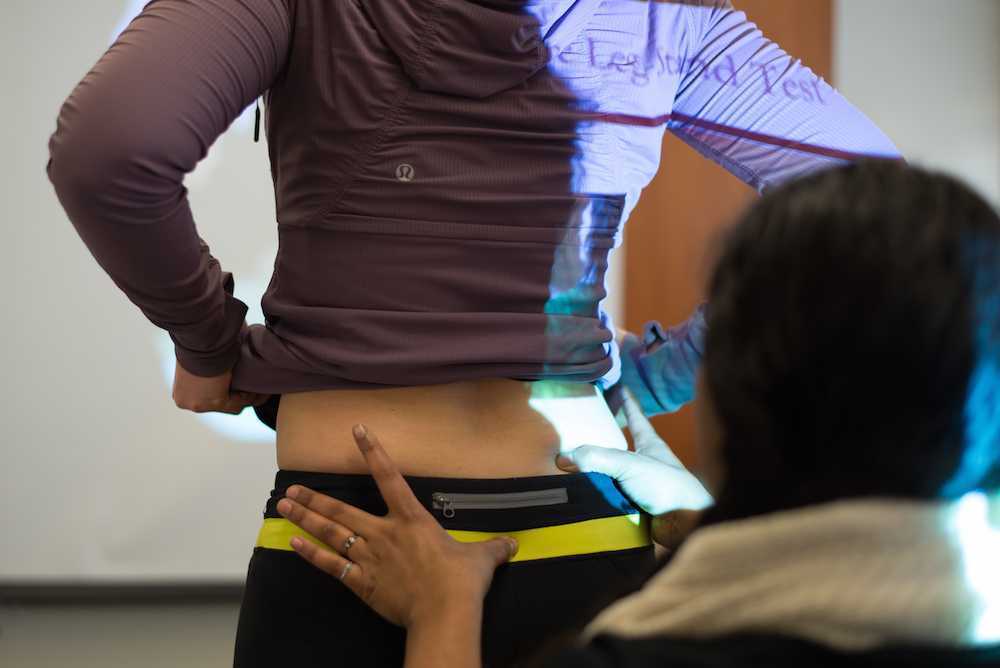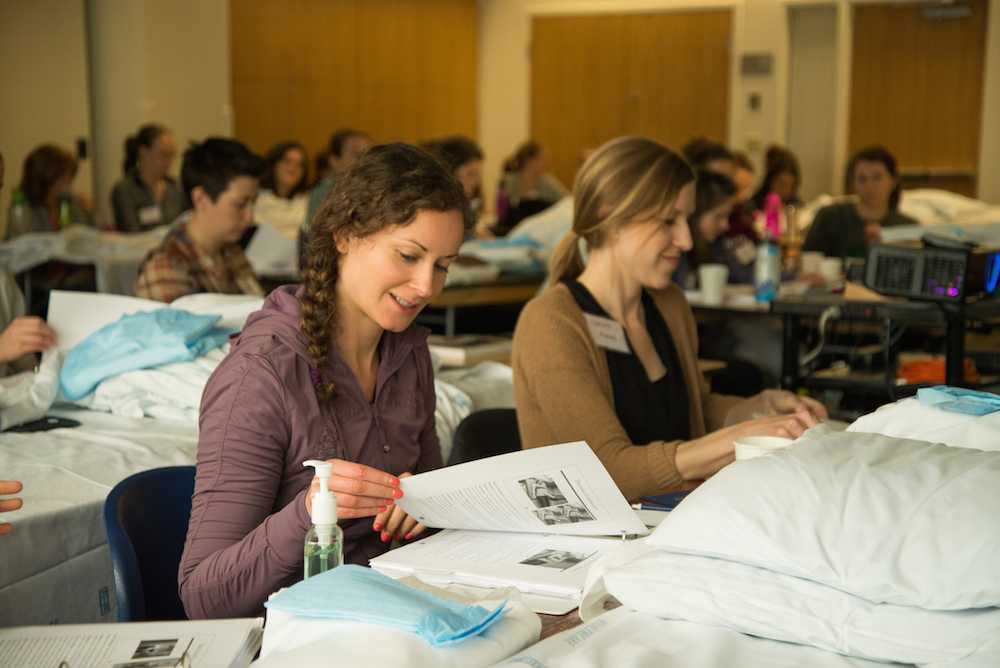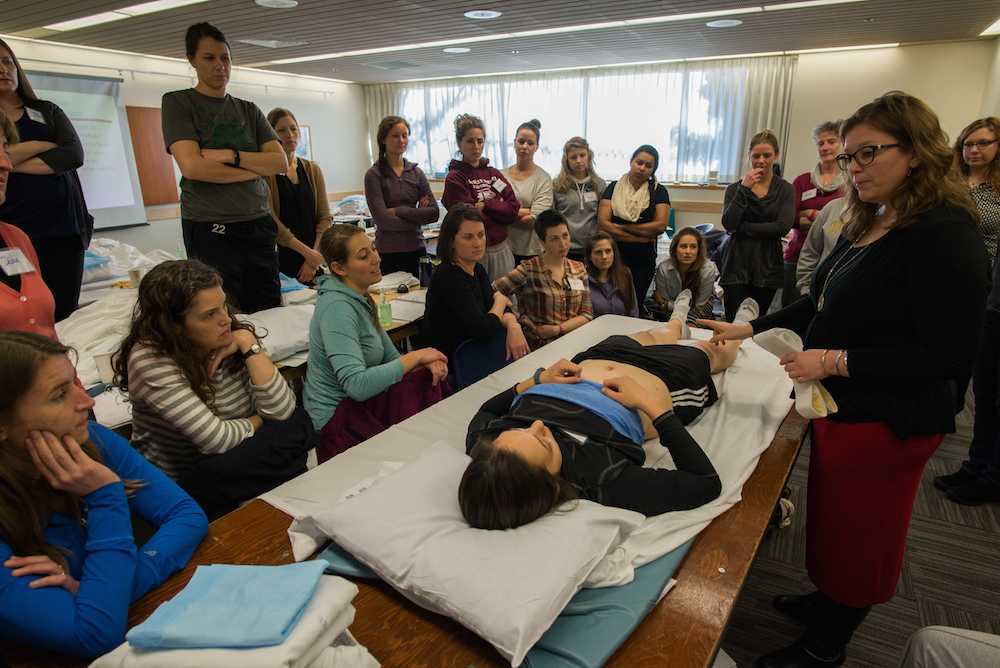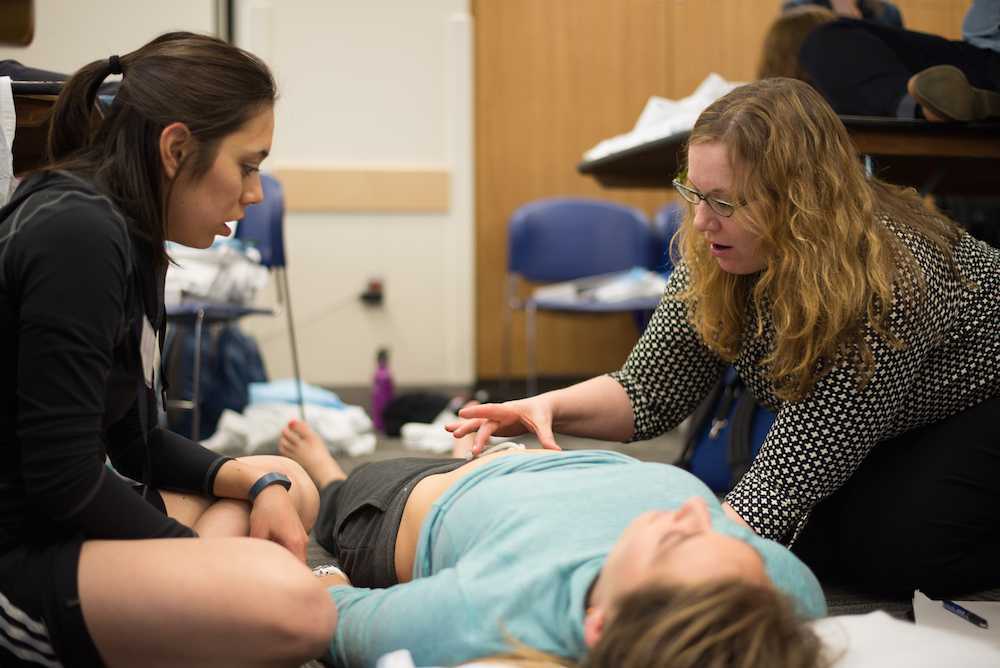This is a satellite offering of our course, Pelvic Floor Level 1. A satellite means that participants will be gathering in a given location and watching the instructor present remotely on the same screen. During labs, participants will pair up and practice labs with one another. This is the self-hosted option for the satellite course.
What does self-hosted mean? The self-hosted option is for those who live in very remote/inaccessible regions, who are practicing stricter social distancing, and are comfortable with self-lead, independent learning. Participants will need to sign up in groups of two or more in order to participate in labs. All participants must be therapists who are registered for this course who can give knowledgeable feedback to their partner during lab (no patients other unlicensed people).
Looking for more help and hands-on guidance during labs from vetted teaching assistants who are guiding participants meeting in groups of 10-16? Click here for a list of satellite locations where participants will be gathering at hosted locations with teaching assistants to assist the learning.
This continuing education course is comprised of 10 hours of prerecorded lectures followed by 14 hours of live, interactive remote learning which will be completed by groups meeting at a specific satellite location. The instructor will be presenting to all satellites from a remote location via Zoom. Participants in this event will meet in person to watch the Zoom presentation in the same location and participate in labs together, with the instructor guiding remotely. It is expected that participants will only register for satellites in which they are within driving distance, and adhere to all state and local COVID guidelines, including wearing a mask at all times during the course.
This course was designed to provide a thorough introduction to female pelvic floor function, dysfunction and treatment interventions. This course is geared to the therapist who wants to synthesize the information and apply it to individual treatment programs for urinary incontinence or the musculoskeletal components of urogynecologic pain syndromes such as chronic pelvic pain (CPP), vulvar pain, and interstitial cystitis/painful bladder syndrome (IC/PBS). This continuing education seminar teaches evaluation and treatment interventions by instructional assessment of the pelvic floor muscles with internal vaginal examination and SEMG biofeedback assessment. The information is immediately applicable to clinical practice.
Presentation of evidence-based evaluation and treatment techniques will be emphasized. Outcome measures and quality of life questionnaires will be presented for both urinary incontinence and pain syndromes. Daily lab time allows for supervised instruction of pelvic floor muscle evaluation with external palpation and internal vaginal examination of pelvic floor musculature. For each condition the therapist will learn to: recognize the key signs and symptoms that lead to impairment, functional limitations and disabilities; use an evaluation/outcome tool; and perform a suggested protocol of treatment interventions. Clinical treatment interventions will include therapeutic exercise, external manual therapy, patient related education/behavioral instructions and electrotherapeutic modalities.
Please note, the Pelvic Floor series of courses typically fill up about 2-3 months before the scheduled course date. It is highly recommended that participants register well in advance to reserve their seats. If you need your employer to send a check for your registration payment, please click the Request Invoice button on the course event page to reserve your seat.
Special Considerations:
As this continuing education course includes extensive lab work, all course attendees should come prepared to participate as both clinician and patient. Vaginal pelvic floor muscle examinations will be taught in labs. Labs will be conducted under the supervision of instructors and teaching assistants. There will be a ratio of at least one instructor/assistant for every ten participants. Past participants have found that wearing comfortable clothing that is easy for changing (such as skirts or athletic shorts) is very useful for labs. Due to temperature variations from clinic to clinic, we would recommend wearing comfortable layers.
The Herman & Wallace Institute welcomes all professionals who are appropriately licensed at our courses. Being born with a vagina and other female anatomy is not a prerequisite for attending or participating fully in our courses. No one participant will be required to partner with any other participant during labs.
Vaginal examination and internal myofascial manual therapy prior to 32 weeks gestation is not the common standard of medical practice. Participants who are pregnant who wish to participate fully in the entire course including in the lab must bring a clearance letter from their physician allowing them to participate in the labs is required. Participants who are pregnant also have the option of bringing their own lab model for examination, or they have the option of working in a group of three during lab times.
PLEASE NOTE: This course includes internal assessment and exam techniques, which will be practiced in partnered pairs in lab time. H&W strives to foster an environment that is safe and supportive. Survivors of past trauma should be aware that performing or experiencing internal exam may be triggering, and that many, regardless of their histories, feel strong emotions when practicing these techniques. In order to foster an environment that is non-triggering and safe for all participants, we recommend all participants consider the emotional impact they may experience during the course, and consider consulting a trauma counselor or therapist prior to attending. Read more about What to Expect During Courses with Internal Lab Work.
10-14 days before the course, participants will receive an invite to join Teachable, an online learning platform. Teachable is where you will find pre-recorded videos and other pre-requisite learning, manual files, your liability waiver you must sign in order to participate, and any links to Zoom (if the course is a remote option). After the course is over, Teachable is where you will find your post-test and evaluation form to tell us what you thought, as well as your certificate. It is required in Teachable that you complete all components in order. Pre-recorded videos that are required must be watched before going onto the next session.
Audience:
This continuing education seminar is targeted to physical therapists, occupational therapists, physical therapist assistants, occupational therapist assistants, registered nurses, nurse midwives, and other rehabilitation professionals. Content is not intended for use outside the scope of the learner's license or regulation. Physical therapy continuing education courses should not be taken by individuals who are not licensed or otherwise regulated, except, as they are involved in a specific plan of care.
Assignments
In order to derive the most benefit from this course, we ask our participants to internalize the required reading materials and complete a diary assignment prior to attending. Please complete this assignment prior to the first day of the seminar. We ask that participants keep a personal bladder diary measuring and recording fluid intake and urine output for two days - one work day and one non-work day. Specific measurements (use a large measuring cup or urine collection “hat”) of urine output are needed for at least one day, and on the following day, one can estimate by counting seconds while voiding.
1. Bladder Diary (We will complete this as a group activity on the first day of the course)
2. Bladder Diary Assignment Instructions
3. Patient History Form
4. Biofeedback Video - Please download and listen to the presentation
Required Readings
1. Diagnosis, Treatment, and Prevention of Urinary Incontinence
2. The International Pelvic Pain Society Patient's Booklet on Chronic Pelvic Pain
3. Principles of Biofeedback from Professor Tim Watson's website- an incredible resource!
4. Neuromuscular Electrical Stimulation (a download from Tim Watson's site: electrotherapy.org.)
5. IUGA/ICS report on female pelvic floor terminology
6. Many participants find it helpful to review the anatomy of the pelvis and perineum
7. Gray's Anatomy for Students - Available at a 25% Discount for Herman & Wallace registrants with promo code 70484. Registrants who already own a copy of this or a corresponding textbook are not required to purchase an additional one.
Please Contact Us with any questions about the use of this text as a required reading in this course.






